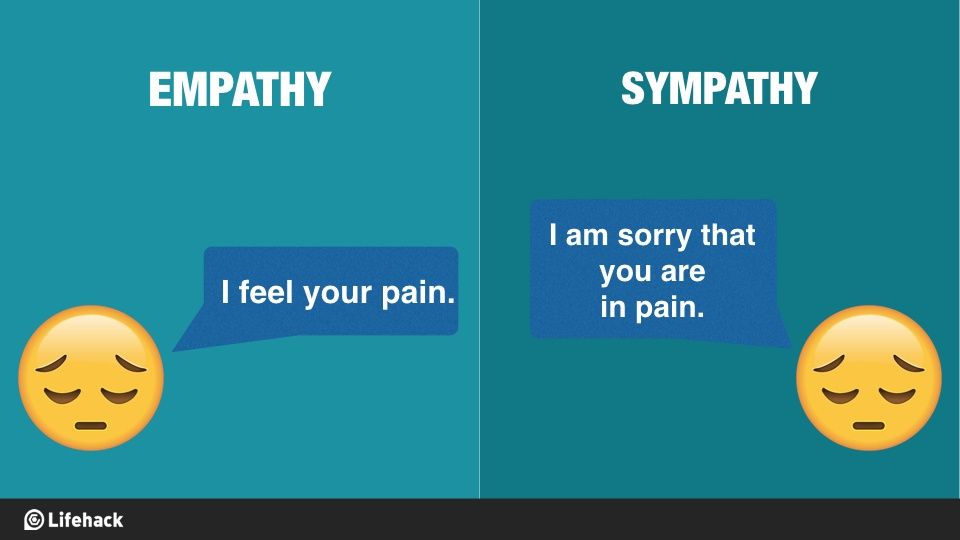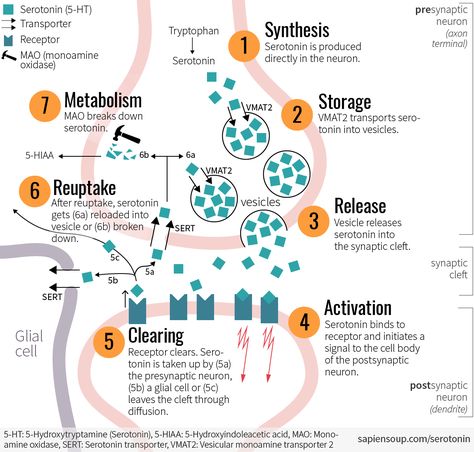How to stop bulimia bloat
Recovering from bulimia
- Bulimia Nervosa
- What are the different types of purging and non-purging in bulimia?
- What are the symptoms of bulimia?
- What are the causes and risk factors for bulimia?
- What are the complications of bulimia?
- How is bulimia diagnosed and treated?
- Recovering from bulimia
- Diabulimia - The rise of a new eating disorder associated with type 1 diabetes
When a person is undergoing treatment for bulimia and is entering recovery from the condition, one of the initial and often disheartening challenges is having to accept the inevitable changes that the body goes through.
While it is seen as a great accomplishment for someone to seek treatment for an eating disorder, it may be embarrassing or intimidating for them to speak to their doctor and/or loved ones about their eating struggles. It is recommended that loved ones be supportive and open to talking to the sufferer about the eating disorder and recovery at any time.
The journey to recovery from an eating disorder is often a long road for a person to travel and takes a lifetime of dedication and commitment to the process of healing and adjusting to healthy eating habits. Recovering from bulimia involves more than simply establishing a healthy relationship with food and eating. The process requires breaking away from old habits and learning new techniques in coping with the stresses of life. Dedication, strength and patience are required to face the inevitable challenges that may arise.
Patients, with the help of a mental healthcare professional will need to understand the triggers which may urge them to re-engage in binge-purge cycles.
In knowing one’s triggers, a person can develop strategies in dealing with these in order to prevent any relapses.
Relapses should not be regarded as a failure or associated with feelings of guilt as these emotions may only provoke further relapses in the future. Relapses can be expected in recovery and individuals should not beat themselves up about them but rather tell a loved one or therapist about the binge-purge episode as soon as it occurs and talk about the emotions that triggered the relapse and how they may prevent this from happening again in the future.
Recovery is a daunting and often difficult process, however, it can be far less intimidating when people know what to expect so as to prevent future road blocks of disengaged loved ones and uncertainty in the course of treatment as these can lead to limited progress, feeling ambivalent and ultimately, dropping out of treatment.
Individuals will also need to bear in mind that each person’s body will react differently during the recovery process and the changes experienced will depend on the severity of the eating disorder and the effects it had on their body.
The below information describes what the majority of sufferers can expect when recovering from bulimia.
The stages of change for recovering from an eating disorder
There are five stages of change13 that have been established to help those deal with eating disorders, these are explained below:
1. Pre-contemplation stage
During this stage, the individual is not thinking about changing or receiving any form of help from loved ones or treatment from medical professionals. Those in this stage may defend their bad habits and not recognise their unhealthy ways of eating as an issue or an eating disorder. Friends and loved ones who are close to the person with the eating disorder are likely to pick up on some of the symptoms of bulimia such as bingeing and purging before the individual admits to struggling with the disorder. He or she may refuse to discuss the topic and deny any evidence of it.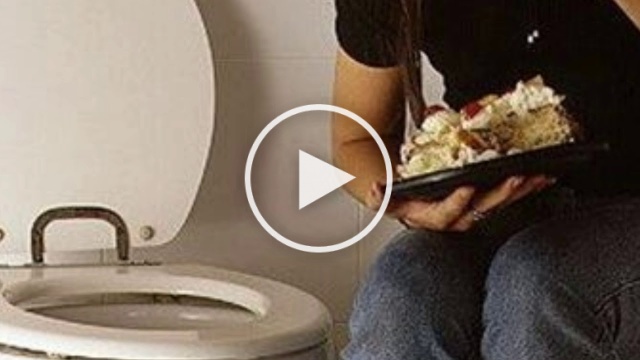 During this stage of an eating disorder, loved ones are advised to seek reliable information on bulimia and help in supporting a loved one dealing with it in order to inform the sufferer of the dangers of their condition and open their eyes to the potential health complications associated with bulimia.
During this stage of an eating disorder, loved ones are advised to seek reliable information on bulimia and help in supporting a loved one dealing with it in order to inform the sufferer of the dangers of their condition and open their eyes to the potential health complications associated with bulimia.
2. Contemplation stage
This stage occurs when the affected person admits that they have an eating disorder and begin to open up to the idea of seeking medical and professional help, however, they may still be uncertain and play with the idea of whether they really have an eating disorder and if help is even necessary.
As this stage progresses, the sufferer may begin to become aware of the consequences of their condition and start to spend time thinking about the complications of their eating habits. He/she may weigh the pros and cons of modifying or even quitting their behaviour. They may also begin to doubt the long-term benefits of quitting due to the fear of weight gain.
The contemplation stage may take a number of weeks, months and even years to work through and move on from. However, loved ones should not lose hope as the sufferer is more likely to receive advice and information regarding their eating disorder during this phase and may be more willing to make use of educational interventions and reflect on their personal thoughts and feelings about their condition. All of this helps in moving them closer to the next step in their process of change.
3. Preparation / determination stage
When a sufferer transitions into this stage, this means that he or she is ready to seek treatment and have made some form of a commitment to change. The individual’s motivation to change is fuelled by knowing they have to do something about their eating disorder as a result of recognising the severity of their condition and the health consequences thereof. During this stage, the sufferer is likely to research their condition further and find what resources and strategies are available to help them to begin to take steps toward improving their health, eating habits and working toward the eventual cessation of bulimic behaviours.
It is often the case that sufferers will skip this stage entirely, moving directly from contemplation to action and their efforts of change, as a result, will face failure due to the fact that they have not adequately researched and accepted the challenges they may face in making a major lifestyle change, not only mentally but physically.
4. Action / willpower stage
During this stage, the person will believe that they have the power and ability to change their unhealthy eating habits and will be actively involved in taking the steps needed to change, using a number of different techniques and options available to them, moving from preparing for change to putting these changes into action.
This stage mostly depends on the willpower of the individual as they begin to make significant efforts in changing their behaviour and quitting their eating disorder. This stage also has the biggest risk of relapse13 as these changes can be daunting.
It is essential that the sufferer trusts the process of treatment and the team and support network available and is also open to new ways of thinking and dealing with stressors in their lives, both past and present.
5. Maintenance stage
In reaching the maintenance stage, the bulimia sufferer will have sustained their action stage for roughly six months or more. The maintenance stage will involve the affected person actively practicing new behaviours and ways of thinking in order to ensure the success of their treatment. A vital part of this phase will involve revisiting potential stressors which have been identified as triggers of bingeing and purging episodes, so as to prevent a relapse.
**My Med Memo – It is important to individuals going through the stages of change to accept that regression is natural and normal. A person may reach one stage, only to regress to the previous one later on. This is to be expected as part of making changes in one’s behaviour.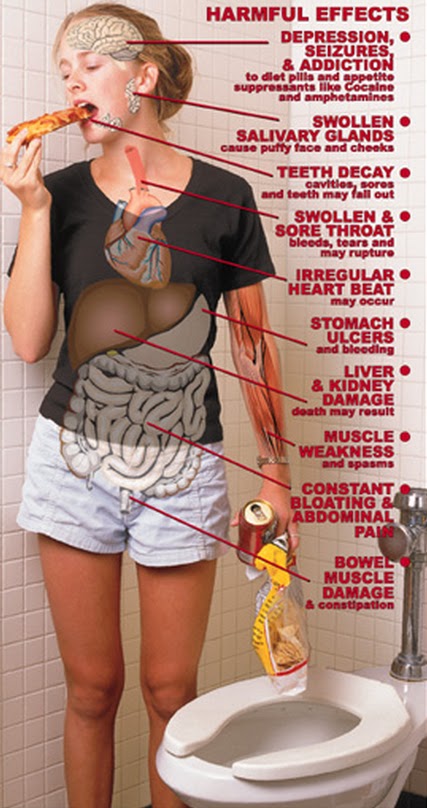 The stages of change should be viewed as cyclical rather than linear in their progression. An individual may go through this cycle of change more than once and revisit a specific stage multiple times before moving to the next. This makes the recovery for someone with bulimia nervosa complex, challenging and completely individualised.
The stages of change should be viewed as cyclical rather than linear in their progression. An individual may go through this cycle of change more than once and revisit a specific stage multiple times before moving to the next. This makes the recovery for someone with bulimia nervosa complex, challenging and completely individualised.
Dealing with the stages of change in a loved one or child
The information below explains how to deal with a loved one or child who may be going through the stages of change in bulimia:
Pre-contemplation stage
- It is important to not be in denial of your loved one or child’s eating disorder
- Educate yourself on the symptoms and signs of bulimia and know what to be aware of
- Do not rationalise his or her eating behaviours
- Try to share your concerns and thoughts openly with the person
Contemplation stage
- If you are the parent of a child who is younger than 18 years of age, then you can insist that he or she receive the help they need from a mental health care professional, it is advised that you do not force your child into anything but rather show your support for the matter in a firm yet loving way.

- Listen to your child and allow them to openly express what they are going through, be prepared to accept blame even though it may not always be accurately attributed.
- Do not attempt to fix the issue yourself, rather seek professional help.
- As a parent and loved one, you will also need support as an eating disorder in someone close to you will take a personal toll, try to find encouragement from friends, family or local support groups for loved ones dealing with eating disorders in children, friends or other family members.
Preparation stage
- Meet with a mental healthcare professional and identify your role in the process of recovery.
- Explore what your personal thoughts on food, body shape, weight and appearance are to assess what influence you may have on the person dealing with bulimia.
- Speak to your child or loved one about their condition, their treatment and how they would like you to be involved.

Action stage
- Ensure that your child or loved one follows their treatment plan.
- Try to remove any triggers from the sufferer’s environment, such as stress (as far as possible) and scales.
- Offer support and encouragement, be caring and warm yet determined and in enforcing the appropriate guidelines and rules, particularly as a parent.
- Try to reinforce positive ideologies on body shape, weight or appearance.
Maintenance stage
- Applaud your child or loved one’s success and milestones in their path to recovery
- Be aware of possible relapses and allow for the sufferer to discuss these with you
The symptoms and signs of bulimia recovery
There are a few notable signs and symptoms that sufferers and loved ones may notice. Some of which are often discouraging to the person in recovery as they may bring about emotions of body image and trigger feelings of doubt and guilt associated with eating.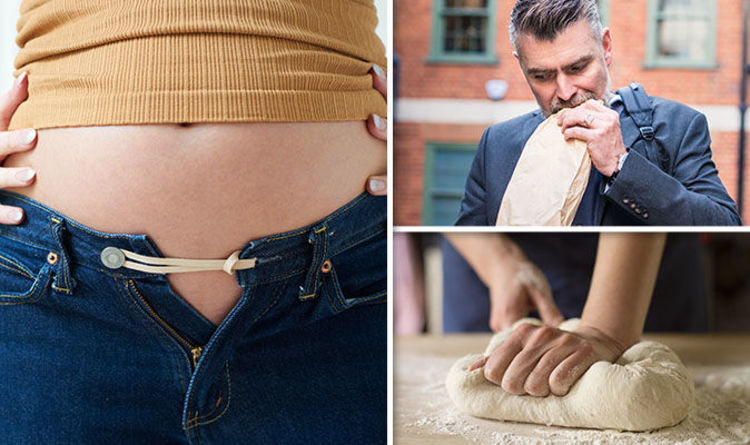 However, these changes are temporary, and the severity thereof will depend on the individual.
However, these changes are temporary, and the severity thereof will depend on the individual.
The initial phase of recovery – the bulimia bloat
The bulimia bloat, also known as ‘recovery bloat’ occurs as a result of the body adjusting to normal eating times and adequate quantities of food during recovery. Eating healthy quantities of food rather than bingeing can result in constipation and gas as the bowels have to deal with processing more food due to the cessation of self-induced vomiting and/or attempt to work without the aid of laxatives. The digestive system attempts to regulate itself and normalise according to new eating patterns and food intake.
A number of people will experience this during recovery from an eating disorder and one should not let this symptom discourage their progress as bloating tends to only last for the initial phase of recovery. The bloating will typically occur within the first few days of recovery and last only for a few weeks. The vital thing for sufferers to remember is that this is a sign of healing within the body and is not permanent.
There are a few tips that may help those experiencing this type of bloating:
- Speak to a doctor about taking probiotics to help digestion get back on track. Some doctors may also suggest the use of digestive enzymes.
- It may help to partake in some gentle exercise, with a doctor’s permission of course. Keep in mind that the body may be weak as a result of healing.
- Avoid any diuretics and laxatives or teas referred as ‘fat-burning’, ‘cleansing’ or ‘weight-loss’ as these will only aggravate the digestive system further and may increase any constipation and bloating, interfering with the goals of the treatment program.
Weight fluctuations
During recovery from bulimia many sufferers will fear gaining weight as a result of no longer purging, partaking in rigorous and compulsive exercise, or using fat burners and laxatives.
It is common for one to experience weight fluctuations during recovery as the body adjusts to regulated food intake and the processing of food naturally, however, it is vital to be aware of the fact that bulimia in itself is not effective in attempting to manage weight anyway.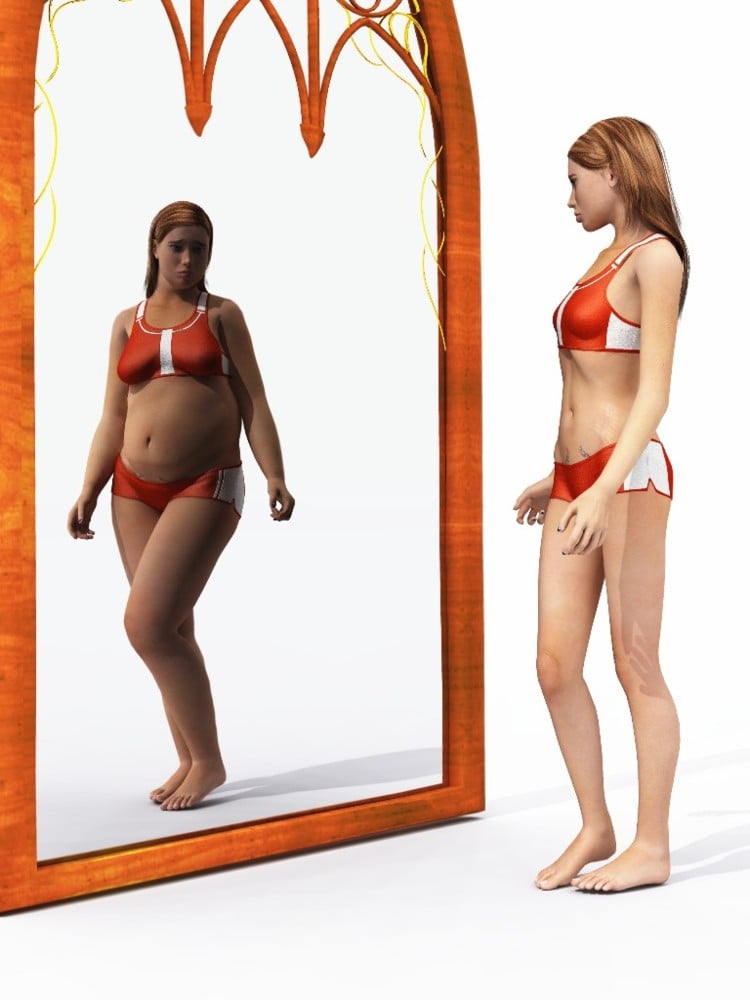 Once a person’s chaotic patterns of eating have settled, their weight will stabilise.
Once a person’s chaotic patterns of eating have settled, their weight will stabilise.
Changing one’s eating habits is bound to have an impact on body weight and appearance. As structured eating is put into practice, the individual will begin to notice changes in their weight, however, this does not happen to everyone. Bingeing and purging during recovery is seen as one of the main causes of weight gain as this interferes with healthy eating habits and healing.
The quicker someone is able to implement and adjust to normal eating routines, the quicker their weight will stabilise. A number of people may actually notice some weight loss as their episodes of bingeing typically involved junk food, some of which would have been absorbed by the body. When the person starts eating healthier foods in smaller portions, their body may react by inducing fat loss.
The below are a few tips for dealing with fluctuations in weight during recovery
Someone who experiences weight gain in recovery will need to learn how to practice patience. Treatment and recovery are both long-term with weight gain being a temporary effect of a return to normal eating. It is best to avoid the scale as weighing oneself may evoke feelings of anxiety and guilt and cause a relapse. It is advised that the person allows their body to heal and learns to consider their symptoms, although disheartening, as a sign of healing and health.
Treatment and recovery are both long-term with weight gain being a temporary effect of a return to normal eating. It is best to avoid the scale as weighing oneself may evoke feelings of anxiety and guilt and cause a relapse. It is advised that the person allows their body to heal and learns to consider their symptoms, although disheartening, as a sign of healing and health.
Water retention
Water retention tends to be episodic throughout recovery from bulimia. Water retention may be a cause of increased sodium intake in food, higher carbohydrate intake, changes in hormones and adjusting to a normalised intake of food. This is a perfectly natural response of the body and should be expected. Again, this is usually temporary.
Here are a few tips for dealing with water retention during bulimia recovery:
- Keep up a steady intake of fluids as fluid loss may result in water retention as the body attempts to hold on to liquid
- Avoid alcohol and caffeine as these liquids lead to water retention
Positive changes in recovery
Recovery is not all bad, it is best not to let the challenges associated with the phases of recovery to be off-putting.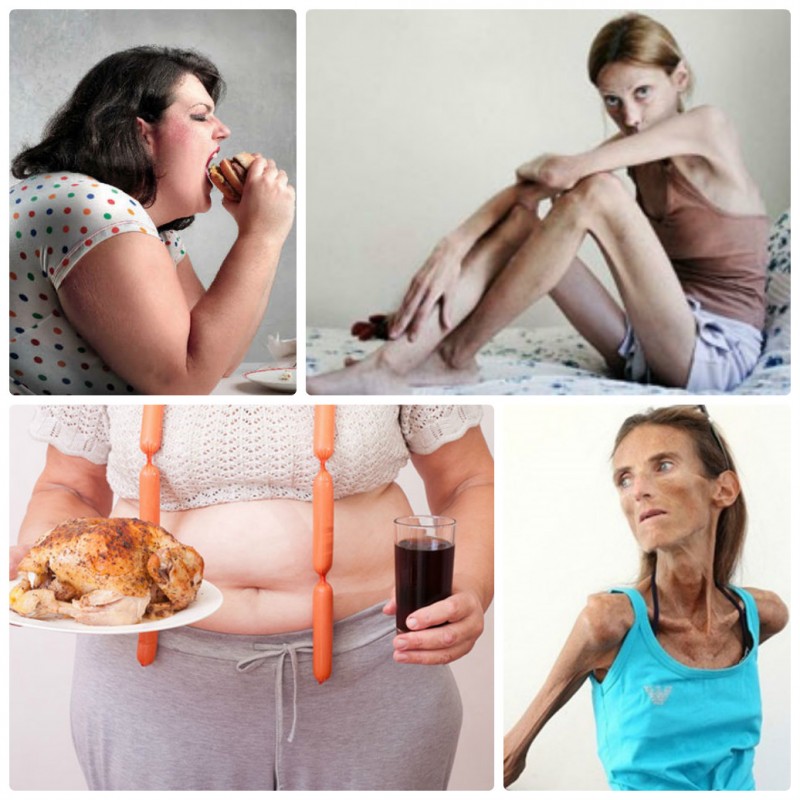 There are some positive changes of recovery that can be expected as a result of a healthy intake of food, constructive mental health sessions and the use of the appropriate medications. These include:
There are some positive changes of recovery that can be expected as a result of a healthy intake of food, constructive mental health sessions and the use of the appropriate medications. These include:
- Increased quality of sleep due to a balance of hormones and lack of hunger which may have once caused one to wake up at night
- Clearer skin (this is often experienced once the body has adjusted to hormonal and dietary changes as skin issues may be experienced during the initial stages of recovery)
- A decrease in anxiety and stress
- Stabilised emotions and mood
- Improvement in self-esteem
- Overall improvement of symptoms associated with bulimia
Bulimia recovery – Refeeding during remission
Although bulimia does not usually result in unhealthy and significant weight loss, refeeding is still sometimes a necessary part of patient recovery. Bear in mind, refeeding is typically used in those recovering from anorexia nervosa as this condition often causes severe weight loss and malnutrition.
Refeeding refers to a form of treatment that attempts to restore a healthy body weight. This form of treatment attempts to rectify the effects of unhealthy eating habits and malnutrition and the impact this has on cognitive functioning and overall health.
The process involves strategically increasing one’s intake of food (calories), ensuring that the body is receiving the right amount of nutrients. For example, the patient may begin with an intake of 1400 to 1800 calories per day, or less, depending on their current state, with this advancing by roughly 300 calories every three days or so, some experts may view this as an aggressive form of refeeding and recommend that calorie increase is more gradual. If this is done in hospital or in a care facility, the attending doctor will monitor the patient’s electrolytes and cardiac health during a refeed, otherwise, the individual will need to stick to their refeeding program at home, with the help of loved ones or parents.
Refeeding should only be done under medical supervision (i.e. through a specialist such as a dietician) and can be conducted via meals or nasogastric (i.e. reaching the stomach via the nose) feeding tubes. In the case of bulimia, a meal-based approach is often favoured as it is associated with fewer health risks and the patient may not struggle with the concept of eating as much as someone with anorexia nervosa. Some patients may require both a meal and a tube-based method. Those with severe malnutrition may eat normally, or as much as they are capable of, during the day, and have a tube at night.
The overall idea and goal of refeeding is to help individuals to normalise their eating behaviour.
What is refeeding syndrome?
Refeeding syndrome may develop when a severely malnourished person begins to up their intake of nutrition (i.e. refeed). It is defined as a shift in electrolytes and fluids that may occur in those who are significantly malnourished and are receiving artificial refeeding (whether this is done enterally through the digestive system or parenterally through infusions or injections into a vein or muscle).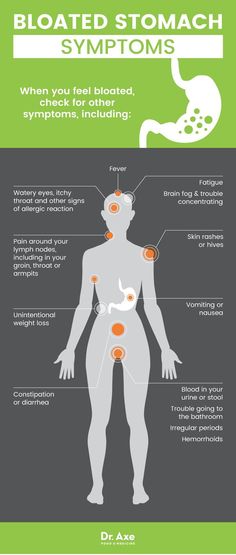 These shifts in the body are potentially fatal14.
These shifts in the body are potentially fatal14.
The symptoms of refeeding syndrome include:
- Mental confusion
- Weakness
- Difficulty breathing
- Seizures
- Heart failure
According to the National Institute for Clinical Excellence (NICE)15, the risk factors associated with refeeding syndrome include one or more of the below:
- A weight loss of more than 15 percent of one’s body weight in the last three to six months
- A BMI (body mass index) of less than BMI of less than 16 kg/m2
- Very little nutritional intake for more than ten days
- Low magnesium, potassium and magnesium levels before the refeed
Alternatively, the risk factors include having two or more of the below conditions:
- A weight loss of more than 10 percent of one’s body weight in the last three to six months
- A BMI that is less than 18kg/m2
- Very little or no nutritional intake for longer than five days
- A history of alcohol or drug abuse (this includes using laxatives, insulin and diuretics)
Not all patients who have one or more of the aforementioned risk factors will develop refeeding syndrome. However, should a patient be at risk, it is vital that they are medically monitored by a team of experienced health care professionals in order to prevent any fatal complications.
However, should a patient be at risk, it is vital that they are medically monitored by a team of experienced health care professionals in order to prevent any fatal complications.
Who is at risk of refeeding syndrome?
Patients who have a high risk of developing refeeding syndrome are chronically undernourished patients, as well as those who have had little to no food (energy) intake in the previous ten days14. Patients with bulimia who fast, or abstain from food after bingeing may be at risk of this.
The development of refeeding syndrome
We have briefly touched on the aim of refeeding and why it is conducted. To further understand the process of refeeding, it is beneficial to be aware of the effect that this form of treatment has on the body. Refeeding syndrome is more commonly seen in those with anorexia nervosa, as these patients are more commonly in a state of malnourishment than to those with bulimia (who often have a normal weight). The below information briefly describes the processes involved in the development of refeeding syndrome.
The shift in fluids and electrolytes that occurs during refeeding are a result of metabolic and hormonal changes that may cause severe clinical complications.
The symptoms of refeeding syndrome are a result of the imbalance of electrolytes which alter function of potassium, magnesium and phosphorus:
- Potassium helps to control cardiac functions in the body, facilitates nerve impulses and regulates blood pressure.
- Phosphorus is a vital electrolyte for the formation of teeth and bone and the activations of a number of vitamin B enzymes and complexes.
- Magnesium aids in increasing the body’s bone mineral density and stimulates brain activity.
Refeeding syndrome is a complex condition that may also lead to abnormal balances of sodium and fluids in the body, changes in fat metabolism and glucose, hypokalaemia (potassium deficiency), hypophosphatemia (low levels of phosphorus), thiamine deficiency (vitamin B1 deficiency), and hypomagnesaemia14 (low levels of magnesium).
When the body is starved for a long period of time it will be in a state of catabolism, this refers to the breakdown of nutrients for energy. When refeeding begins, the body will shift from catabolism to anabolism, also known as an anabolic state wherein it begins to rebuild and repair tissue. The body will get the energy it needs to function from reserved fat and protein. When refeeding occurs, carbohydrates will be introduced to the system again, the tissues will begin to resume their natural process of producing energy from the breakdown of glucose.
When glucose is suddenly increased through refeeding, insulin levels will increase to aid in the transport of glucose to the cells for energy. This surge of insulin and the changes of the body in shifting from a catabolic state to an anabolic state, may result in a chain reaction that causes a largely increased uptake and use of potassium, magnesium and phosphorus in the cells. This results in a number of complications and symptoms in patients, such as confusion, seizures, heart problems and fluid retention, some of these (i. e. cardiac heart failure as a result of low levels of phosphorus) may be fatal. However, through accurate diagnosis, treatment and management, severe complications can be prevented.
e. cardiac heart failure as a result of low levels of phosphorus) may be fatal. However, through accurate diagnosis, treatment and management, severe complications can be prevented.
References:
14. NCBI. 2008. Refeeding syndrome: what it is, and how to prevent and treat it. Available: https://www.ncbi.nlm.nih.gov/pmc/articles/PMC2440847/ [Accessed 13.11.2017]
15. NICE. 2006. Nutrition support for adults: oral nutrition support, enteral tube feeding and parenteral nutrition. Available: https://www.nice.org.uk/guidance/cg32/chapter/1-guidance [Accessed 08.03.2018]
7 Causes of Bulimia Bloating (& What YOU Can Do)
If you’re experiencing bulimia bloating, you are not alone. It’s quite probable, because of the causes of bulimia bloating, everyone with bulimia will experience it at some time or other. And especially in the early stages of recovery.
However, as you’ll discover in this post, there is a lot you can do to alleviate and perhaps even prevent it, moving forwards.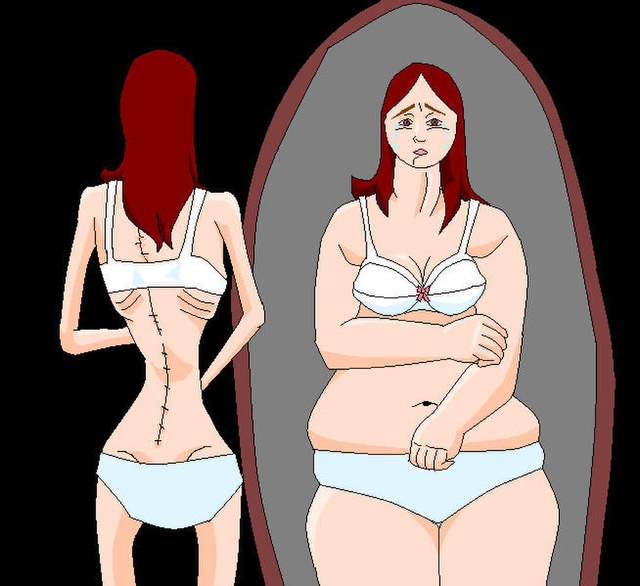
But just before we dive into the whys and wherefores of bulimia bloating and how to deal with it, to reassure you…
- Bulimia bloating does not equate to getting fat, being fat, or ‘real’ weight gain: Any weight gain from bloating is temporary.
- For most people, bulimia bloating does not last. (Although for some people, the side effects of bulimic behaviours can cause long-term issues with the gastrointestinal tract, including bloating).
However, regardless of knowing the above…
when bulimia bloating hits, it can be incredibly challenging physically, mentally and emotionally.
- Not only has your belly ballooned into a rock-hard ball, making you look several months pregnant so nothing fits, it’s incredibly uncomfortable, often very painful and sometimes embarrassing.
- The swelling can be quite rapid and sudden, triggering all sorts of scary thoughts and feelings, not just because it can make you feel fat or believe you’ve gained weight, but because it can make you feel unsafe and vulnerable and even wonder if there is something seriously wrong.

- And it can negatively impact your work and your social life, causing further distress and isolation, especially if bulimia is a secret
I remember only too well…
- Canceling arrangements last minute because I was in too much pain, nothing fitted, or I felt too fat to be seen.
- Undoing the button on a skirt or letting out a belt, one hole, two holes, sometimes four or five holes, to accommodate a belly that seemed to have taken on a life of its own.
- Times when I could barely stand up straight and one time even being carried out of a restaurant.
Whilst uncomfortable and sometimes embarrassing, the greatest distress came from …
- Equating the bloating with being fat or gaining weight.
- Feeling totally let down by my body and that I couldn’t trust it.
All too often those thoughts, of being fat or let down by my body, would trigger a “WTF” moment and I’d binge and purge. And, all too often I’d slip into the mindset that recovery just wasn’t worth it and end up relapsing. Needless to say, I’d be super upset and frustrated with myself.
Needless to say, I’d be super upset and frustrated with myself.
Perhaps my experiences sound familiar?
Making Bulimia Bloating less scary.
At the time I had no idea what was going on, hence my erroneous conclusions to go “F it!” but
HAVING AN UNDERSTANDING AS TO WHY BULIMIA BLOATING HAPPENS AND WHAT YOU CAN DO ABOUT IT CAN…
- Make it far less scary
- Allow you to have some [much needed] compassion for yourself.
- Help you better cope with it
- Speed up your recovery efforts.
- Empower you
Medical disclaimer. Please remember I am not a doctor. The content of this post or any other on bulimiafree.com is not or should not be interpreted as medical advice. If you have any medical concerns or symptoms, please see your doctor.
7 Common Causes of Bulimia Bloating
1. Dietary Restriction, Purging, and Bulimia Bloating.
Any form of dietary restriction and or purging will, over time, lead to an energy deficit in the body and malnutrition. In response, your body’s metabolism slows down and digestion is disturbed.
In response, your body’s metabolism slows down and digestion is disturbed.
You may not have considered this but your body needs adequate energy (calories) and nutrition for effective digestion.
Without it…
- Food stays in the stomach longer and its passage through the gut is prolonged because the muscles of the Gastrointestinal Tract have been weakened. (Weakened abdominal muscles may also cause the belly to look bloated)
- Food does not get broken down properly as the digestive enzymes and healthy levels of bacteria are compromised
Resulting in..
- Fermentation, gas and bloating.
- Poor food absorption and assimilation; perpetuating a lack of energy and nutrition in the system, causing more bloating and digestive distress.
And because…
Regular vomiting causes the pH balance of the stomach to become too alkaline, not only is effective digestion further compromised but the vital electrolyte balance can be disrupted, leading to further issues and complications.
Now you might think you are eating enough and you might be.
But it’s also possible you’re not!
You see as part of your recovery, it’s quite likely that some kind of cellular repair is necessary to strengthen your digestion and gastrointestinal tract.
And for this INCREASED ENERGY AND NUTRITION (aka Food) IS A NECESSITY.
Perhaps you can see the dilemma here?
Any increase in food intake is going into a depleted system.
With digestion and assimilation weakened, perhaps dramatically so, particularly if you’ve been struggling with bulimia for a long time, or it’s been severe, or you’ve had anorexia, discomfort, and bulimia bloating is likely.
Because of the physical discomfort of bulimia bloating, it is possible you may stop eating before you’ve eaten enough. (Which may trigger bingeing later on).
And because of the psychological distress; increased anxiety and negative body thoughts around food and meal times, you may become fearful of food and develop a resistance to eating and or, purge after eating.
BUT EATING ADEQUATELY & CONSISTENTLY OVERTIME IS A MUST IF YOU ARE TO RECOVER & BE FREE.
So, unfortunately, whilst it’s likely there will be some, maybe a lot of discomfort and distress during recovery because of bulimia bloating, you will not escape it by continuing with the behaviours of restricting, binging and or purging: Not just that, you are likely to make things a lot worse for yourself.
It’s worth keeping in mind…
- Before you see any real benefits of recovery, you will first have to take on some really challenging days.
- Winning those challenging days will serve to make you stronger.
2. Water Retention and Bulimia Bloating.
The body tends to retain water whenever there is dehydration: And because all forms of purging; vomiting, over-exercising, laxatives and or diuretics, cause dehydration, water retention is common in bulimics along with the accompanying bloating.
This can be exacerbated if there have been disturbances in the electrolyte balance, a common side effect of purging.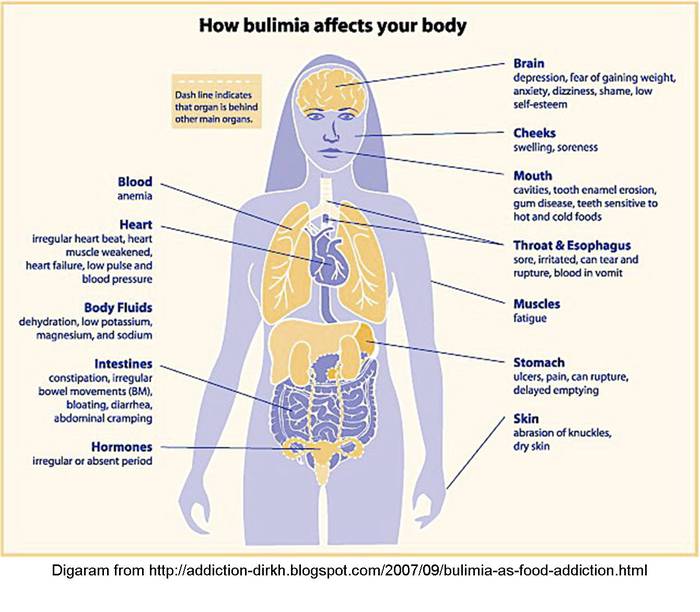
Water Retention Speeds Up The Repair Process of The Body.
You may also experience bloating due to the body’s tendency to retain water, particularly around the site of [cellular] repair, as fluid allows nutrients and waste to travel more effectively in and out of the cells.
3. Anxiety, Stress and Bulimia Bloating.
It might seem strange that anxiety and stress can cause bulimia bloating but because the brain and the gut are connected by the central nervous system, you cannot separate what is happening in the brain, with regards anxiety and stress, and what happens in the gut.
Whenever the brain perceives a threat to your survival, or there’s some kind of anxiety or stress and or low blood-glucose concentration, the flight-fight mechanism is activated and cortisol is released.
And there’s no doubt about it…
- Bulimia is a threat to your survival.
- Living with bulimia causes great anxiety and stress
- Low blood-glucose is induced by not eating enough, ‘starving’ yourself or bingeing then throwing up.
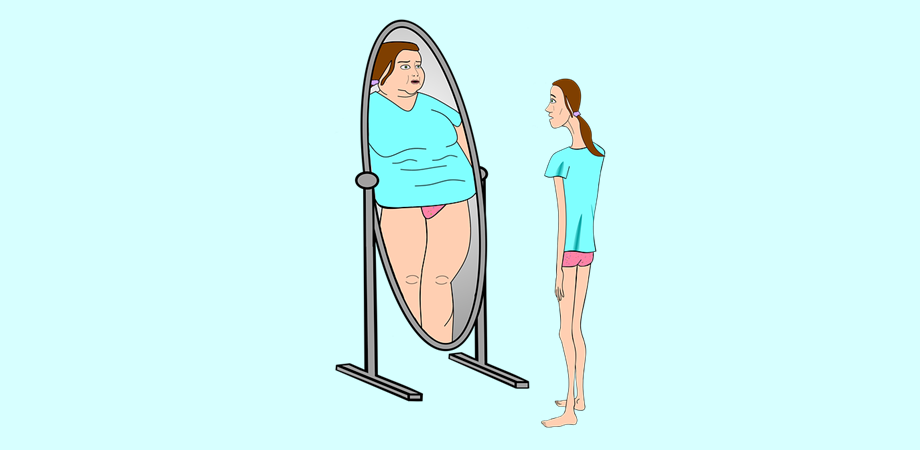
And whilst recovery is not a threat to your survival, it can be stressful.
Now cortisol isn’t ‘bad’: It is a vital part of the flight-fight mechanism, that diverts blood from the digestive system to the muscles, so you can flee or fight.
But because this threat or stress isn’t external, you don’t fight or flee and the cortisol remains in the system. And to a lesser or greater degree, depending on the individual, digestion is disrupted and slowed down, resulting in bloating and or constipation.
4. Food Allergies or Sensitivities and Bulimia Bloating
A weakened and compromised gastrointestinal tract can lead to food allergies, sensitives or intolerances, all of which can cause bloating.
As tempting as it might be to cut out suspect foods, this may not be your best course of action because…
- Eliminating foods runs counter to recovery
- Working out potential food allergies or sensitivities is tricky and time-consuming (although your eating disorder might like it as it).

What if it is not the food itself, that is the real problem?
What if it is the bulimic behaviours that have lead to imbalances and disturbances in the gastrointestinal tract?
You see it is quite likely if it weren’t for bulimia, your gastrointestinal tract that would be perfectly capable of dealing with any food*.
FIRST, HEAL YOUR GUT.
For information on this see “Strategies To Reduce or Alleviate Bulimia Bloating” section below.
*It is possible for food allergies and sensitivities to cause an eating disorder because of the elimination and restriction.
5. Constipation and Bulimia Bloating
Constipation is probably the most obvious go-to reason why your belly is bloated which can lead to an overuse of laxatives However, it’s constipation is the end result of a compromised, ineffective and sluggish Gastrointestinal Tract and dehydration, that needs nourishing and hydrating, not more and more laxatives.
6. Eating Too Fast and Bulimia Bloating
Do you feel anxious and or guilty when eating? If so, it’s quite likely you are eating too quickly, which may have you ingest air at the same time: Air that sits in your stomach, resulting in bloating.
Chewing gum can also cause bloating because of the tendency to ingest air as you chew, as can breathing in through your mouth when exercising.
7. Not Getting Enough Sleep and Bulimia Bloating
When struggling with bulimia, it’s very common to have interrupted or too little sleep.
As you may have experienced, too little sleep is stressful; physically, mentally and emotionally, especially to a body and brain that are already distressed and depleted. The resulting raised cortisol level that lingers in the body may disrupt digestion, causing bloating and can further interrupt sleep.
The Bad News & The Good News on Bulimia Bloating.
If you have bulimia you are likely to experience bulimia bloating to some degree.
However, the GOOD NEWS: There’s a lot you can do to alleviate bloating and possibly even speed up the time you experience it in recovery.
Which of course begs the question, most of my clients ask me as a bulimia recovery coach, “How long will the bloating last?”
The thing is, there is no set answer.
Duration and severity vary from person to person. However as I mentioned above, there is a lot you can do about bulimia bloating to make you feel far more empowered in the matter and support your recovery.
7 Strategies To Reduce or Alleviate Bulimia Bloating
& Heal Your Gut.
NOTE: Keep in mind, bulimia bloating is ‘normal’ given the circumstances, however, it’s a good idea to visit your doctor, particularly if any pain is severe and or prolonged.
Bulimia Bloating Strategy #1: Mindset
Accept The Bloating & Allow It To Be: Resisting it or wishing it wasn’t happening, creates a whole lot of thinking all focused on the problem. This actually makes it (and you) feel so much worse. Remember, anxiety or stress will cause and or increase bloating.
So, rather than increase it, alleviate it…
Perhaps you have heard the saying, “What you resist, persists”?
So, have a go at accepting the bloating. Just as it is, with no judgment, and allow it to be. Gently slow down your breathing (if you can lie down). Place your hands on belly and feel it rise and fall as you breathe (slowly) and
Just as it is, with no judgment, and allow it to be. Gently slow down your breathing (if you can lie down). Place your hands on belly and feel it rise and fall as you breathe (slowly) and
“Reframe” the bloating. As bulimia bloating is more prevalent in recovery, either because you are increasing your food intake or keeping it down, see it as a symptom of recovery, a sign your body is healing and balance is being restored. And send healing your body some healing thoughts.
With a little practice, you should notice yourself feeling calmer and more relaxed, within a minute or so.
TIP: Practice the breathing technique in Strategy 7 as part of a daily strategy to alleviate anxiety whilst at the same time making it more effective when you are actually experiencing any bloating.
Awareness: Understand how certain beliefs and assumptions you have about your body, eating and the bloating itself, may actually be worsening your symptoms and perpetuating the pain.
For example…
- Bloating equals weight gain or fat, (it doesn’t)
- Feeling empty is ‘good’ (not really),
- Feeling hungry is ‘bad’ (it’s not).
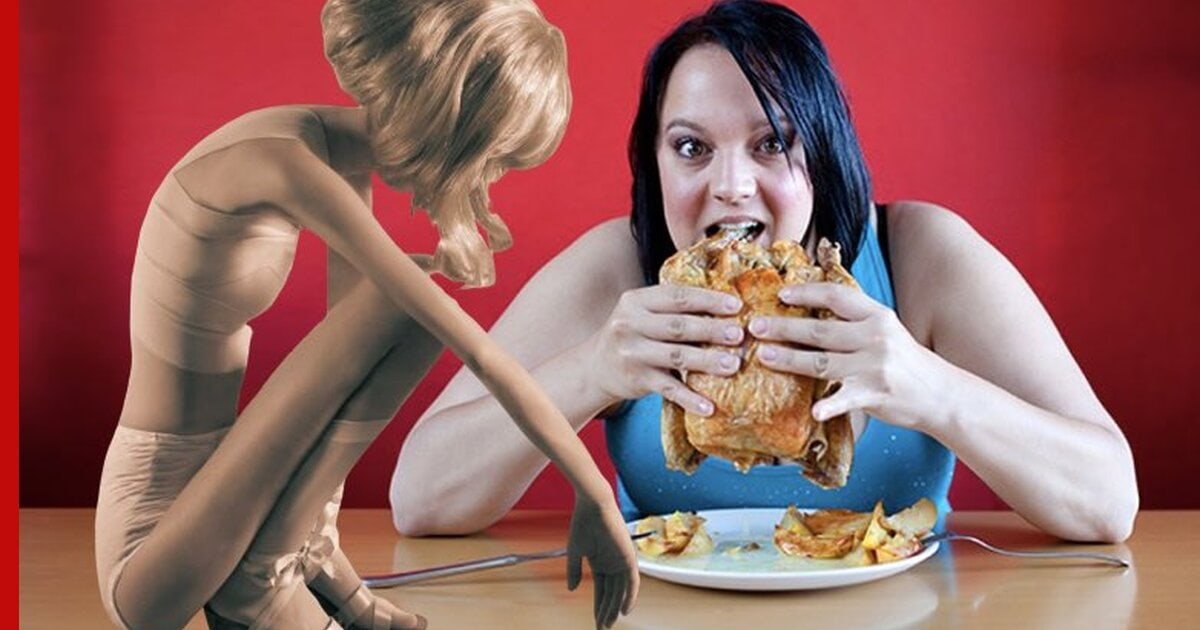 I know it can make you fearful of bingeing but feeling hungry means you are low on energy and it is time to eat, not a time to binge.
I know it can make you fearful of bingeing but feeling hungry means you are low on energy and it is time to eat, not a time to binge. - Feeling full is a signal to binge and or purge (it’s not). Feeling full is a normal and expected feeling of eating and signals the time to stop.
Dump the scales and measuring tape. Drop weighing yourself or your food. Forget counting calories and reading ingredients on the backs of packs and bottles. STOP dieting and listening to what others say you should or shouldn’t eat and START listening to ‘the best nutritionist in town’, your body.
Be Committed to your recovery, to your freedom, above all else.
ALERT: Bulimia bloat can seem a ‘rational’ reason to binge and or purge but don’t be tricked, this is the ‘eating disorder voice’; following through on that thought, will only perpetuate the problem. STAY STRONG.
How to manage that eating disorder voice is something I cover in depth in my coaching programs, as it is probably the biggest hindrance to a successful recovery.
Bulimia Bloating Strategy #2 Eat Well
A depleted system needs nourishing, balance and consistency. So…
- Eat regular meals and snacks throughout the day. Each day. Every day. And be purge free.
- Eat nutritionally balanced meals with a variety of protein, fats, carbs and fresh vegetables and fruit. Remember fuelling your body with adequate calories and nutrition heals your body. It increases the energy in your body and strengthens your digestion It also reduces bingeing and anxiety and will resolve many of the symptoms and side effects of bulimia.
- Avoid eating the same ‘safe’ food over and over again, even so, called ‘healthy’ foods. This way of eating doesn’t really keep you safe, it can cause malnutrition, a weakened gastrointestinal tract, food sensitives, intolerances, even allergies and bloating.
- As your digestion gets stronger, you’ll find your body more able to deal with all foods.
ALERT: A lack of fat in your diet causes bloating! Click here to find why “Fat Is Good For You!”
- As much as you can avoid overly processed foods, this includes ‘diet’ foods and sodas, particularly those containing fake sugars such as sorbitol, mannitol, xylitol, lactitol, and maltitol.
 These fake sugars are known to cause bloating.
These fake sugars are known to cause bloating. - If you are someone who has difficulty digesting fructose, you may want to avoid eating too many fruits and smoothies that contain a high ratio of fructose to glucose, for example, apples, pears, watermelon, and mango, as they can cause gas and bloating.
- High fiber foods can also be problematic when digestion is weak and the passage of food through the gastrointestinal tract is slow: There is more time for fermentation and gas production. So, notice how your body reacts to fiber and respond accordingly.
TIP: STOP all ‘dieting’ or any form of food restriction even those that appear ‘healthy’ and START following a “Structured Eating Plan”, an effective, proven strategy for recovery that works on many levels. Structured Eating and Meal Planning has formed the basic foundation for the full and lasting recovery of many people, including mine. And you’ll be healing the causes of bulimia bloating at their roots.
Bulimia Bloating Strategy #3 STOP Purging.

STOP purging. Whether that is throwing up, over-exercising or overusing / abusing laxatives and diuretics. It needs to become a non-negotiable behaviour: And the sooner the better. Not only does it help prevent bloating it also helps to stop bingeing.
Bulimia Bloating Strategy #4: Aid Your Digestion
‘Come to the table’ and eat in a relaxed state of mind.
You may be surprised to know, digestion and assimilation of your food are not so much about ‘what you eat’ but more about ‘HOW YOU EAT’.
Digestion and assimilation happen best when the body and mind are relaxed.
Now feeling relaxed probably isn’t your experience with food and eating. However, it is possible for you to induce a relaxed state by simply [consciously] changing and focusing on your breathing. You’ll find a short and simple breathing exercise in Strategy 7. Although simple it is not so easy to do, however, the benefits are well worth the effort.
Support your gut function with some probiotics.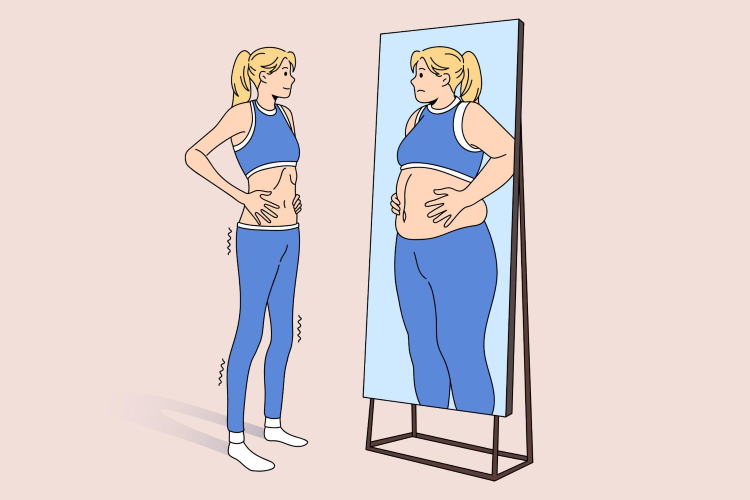
Probiotics (pills or powder) can put some ‘good’ bacteria back in the gut as can certain foods** and therefore help to aid digestion.
**Fermented foods such as kombucha, kimchi, miso, sauerkraut can be beneficial. However, if you’re dealing with a yeast overgrowth, a probiotic supplement may be a better choice. If you’re not dairy intolerant, you could try whole fat milk from grass-fed cows or organic yogurt. If you are, unsweetened sheep or goats milk or yogurt may be a good alternative.
ALERT: There is some controversy about the effectiveness of probiotics. So, do your research as to whether you think they are right for you and which one is right for you. Everybody is different, so seek professional help if you’re unsure.
Drink herbal teas like peppermint, fennel or ginger to aid digestion.
Bulimia Bloating Strategy #5 Stay Hydrated.
Drinking enough water regularly throughout the day, every day will help to not just hydrate your body but also bloating and can help release weight caused by water retention. However, avoid drinking a lot of water at any one time, the cells of your body do not like to be drowned.
However, avoid drinking a lot of water at any one time, the cells of your body do not like to be drowned.
To make an interesting change to plain water try adding…
- Sliced ginger, lemon or fresh mint to hot water.
- Sliced fruits, such as lemon, lime or orange or cucumber & strawberry to cold water.
Coconut water is delicious and also has a number of important electrolytes such as potassium and magnesium.
Bulimia Bloating Strategy #6 Exercise
Physical activity stimulates the muscles of your digestive tract, which helps move food and any air bubbles that make you feel bloated through your gastrointestinal tract. So, taking some gentle exercise, like walking or swimming or yoga should be beneficial.
Bulimia Bloating Strategy #7 Self Care
Good self-care reduces stress, anxiety and even depression.
- Cut yourself some slack and BE kind to your Self. TALK kindly to yourself (self-talk) and about yourself to others.
- Get enough sleep.
 Get enough rest and get enough down or chill time. If and when necessary, if you want a snooze in the afternoon and you can, then snooze: It’s not lazy but healing.
Get enough rest and get enough down or chill time. If and when necessary, if you want a snooze in the afternoon and you can, then snooze: It’s not lazy but healing. - Learn to ‘listen’ to what YOU want or need to do and how to say “No” powerful but politely.
- Reduce anxiety and stress levels by practicing a deep breathing exercise to induce the ‘relaxation response’ to move your body and mind into a calmer state and to support your digestion. Simply by exhaling for a few counts longer than inhaling, (several times), something you can do anywhere, anytime, can do the trick. However, if you incorporate a breathing exercise to induce relaxation into your daily routine, you will get the most benefit. – but it works best, that is you get the desired result when practiced consistently over time).
- You may want to consider relaxation, yoga or meditation classes or perhaps listen to some relaxing music.
- Wear loose clothing or things that don’t cut across your waist like belts, tight jeans and skirts, particularly if you’re sitting down for a long time.

- Try a [covered] hot water bottle or a ‘wheatie’ bag over your belly or perhaps a gentle stomach massage (moving a hand over your belly in circular clockwise motion), with some oil with perhaps a few drops of peppermint oil
I used all the above strategies when I was on my journey to bulimia freedom as do my private clients. Individually they all help, collectively they provide a powerful and effective way to not just reduce bulimia bloating but support bulimia recovery in general.
Finally…
Please don’t ignore persistent pain or bloating, Functional Gastrointestinal Disorders (FGIDs) are very common in patients with an Eating Disorders and a high percentage of women met the criteria for irritable bowel syndrome (IBS). Source: https://www.ncbi.nlm.nih.gov/pubmed/21105315
Julie Kerr
Bulimia Recovery Coach
Julie won a 15 year battle with bulimia over 30 years ago and now mentors and coaches others to bulimia freedom. She is a compassionate, caring bulimia recovery coach who brings a unique and powerful perspective on recovery that has helped people from all walks of life, not just stop bingeing and purging but learn how to love themselves and their bodies and create a life they love.
Click here to discover how Julie could help you “Break Free & Stay Free”.
7 Causes of Bloating With Bulimia (and how to deal with it)
Tags: Bulimia, Mistakes and Mistakes, Laxatives, Expert Tips, Chronic EDD not alone. Bloating is the leading complaint among patients at the first stage of rehabilitation when restoring gastrointestinal function after bulimia or anorexia (on average, such complaints begin after 4.5 therapeutic sessions). It can be said that everyone who struggles with this disorder sooner or later encounters this phenomenon. And this is quite normal, especially in the early stages of recovery.
In this article I will tell you how you can relieve the symptoms of bloating and maybe even prevent it from happening without giving up treatment.
But before we begin to analyze the causes of bloating in bulimia and how to deal with it, I hasten to assure you that:
- Bloating in bulimia has nothing to do with obesity and actual weight gain.
 Gaining weight by weight is not the same as gaining actual weight. And bloating is only a temporary phenomenon.
Gaining weight by weight is not the same as gaining actual weight. And bloating is only a temporary phenomenon. - In most cases, bloating in bulimia resolves fairly quickly.
However, notwithstanding the above...
It can be very difficult for you to deal with bulimic bloating (physically, mentally and emotionally).
Not only do you feel as if you have eaten 5 kg of food, you cannot fit into your favorite jeans, and others begin to suspect that you are deeply pregnant, but at the same time you also constantly experience rather unpleasant, and sometimes even painful sensations. But it’s more difficult to survive - it’s fear, anxiety that you are “fat” again, that you have increased in volume, the feeling that you have added at least a kg. 5 weights - and these feelings are harder and harder to wear than everything written above.
- Your stomach can swell quite suddenly and cause you to have an attack of panic and anxiety.
 And not only because it may seem to you that you have become very fat, but also because it will seem to you that you are absolutely helpless from the fact that you are not able to control this process. And the loss of feeling - Control in those suffering from eating disorders - is leading to a feeling - anxiety and, as a result, to a return to eating disorders. "Better an empty stomach, nothing to eat than to endure such a war in the stomach!" such a basic idea. That is, bloating interferes with treatment.
And not only because it may seem to you that you have become very fat, but also because it will seem to you that you are absolutely helpless from the fact that you are not able to control this process. And the loss of feeling - Control in those suffering from eating disorders - is leading to a feeling - anxiety and, as a result, to a return to eating disorders. "Better an empty stomach, nothing to eat than to endure such a war in the stomach!" such a basic idea. That is, bloating interferes with treatment.
You can:
- Cancel appointments at the last minute because you feel terrible, you don't fit in anything, and you think you're too fat to go out in public.
- Unfasten a button on a skirt, loosen the belt on trousers, first by one hole, then by two, and sometimes by 4-5 at once, in order to fit your stomach, which, as it seems to you, suddenly began to live its own life.
- Take laxatives
- To arrange food breakdowns on purpose to induce vomiting.
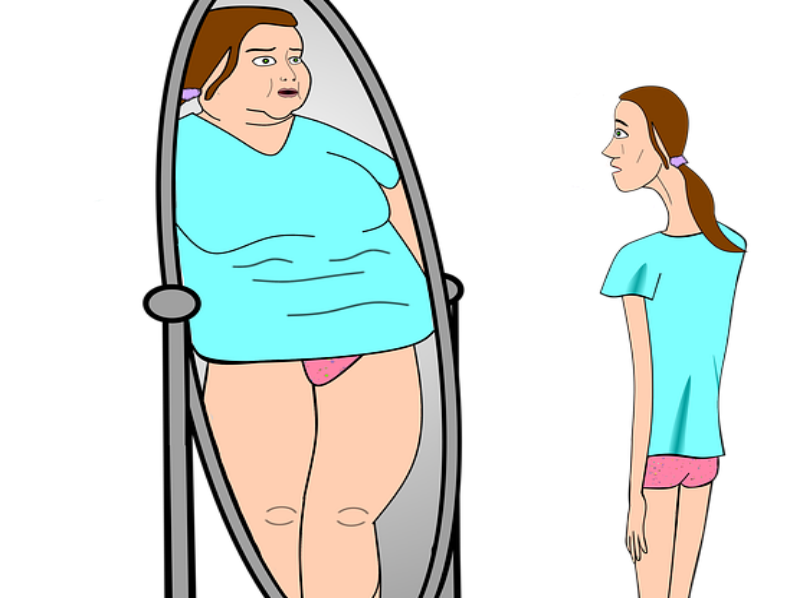
In addition to physical and psychological discomfort, the most difficult thing to deal with:
- The thought that a bloated belly is the result of sudden weight gain.
- With the feeling that you are unable to control your own body and its processes, and that you can no longer trust it.
Very often, all these thoughts that you are fat, and that your body is your main enemy, cause serious eating disorders. And every time you start to think that recovery is not worth all this effort, and everything starts all over again. Needless to say, you can be very depressed and dissatisfied with yourself by criticizing yourself and tightening your diet.
Bloating while recovering from Bulimia is normal!
It would be a mistake to ignore the physiology of the body - knowledge about it, so we spend the time in therapy necessary for you to figure it out and eventually get real tools to control the body by removing anxiety and myths.
ONCE YOU UNDERSTAND WHY YOU HAVE PUTTING AND WHAT YOU CAN DO WITH IT:
- Bloating will no longer seem like such a terrible problem.
- You will become more tolerant of yourself and begin to accept your body.
- Learn to manage bloating.
- Speed up your recovery.
- Get a new boost of energy and motivation for further mental work on an eating disorder.
7 Most Common Causes of Bloating in Bulimia
1. Food Restriction, Purge and Bloating in Bulimia.
Any dietary restriction and constant "cleansing" sooner or later lead to a serious deficiency of energy and nutrients in the body. As a result, metabolism slows down and indigestion occurs.
Think about it: your body needs an adequate supply of energy (calories), healthy microflora and nutrients to support normal digestion.
Otherwise…
- Food stays in the stomach longer and its passage through the intestines slows down because the muscles of the gastrointestinal tract are weakened.
 (Weakened abdominal muscles can also cause bloating.)
(Weakened abdominal muscles can also cause bloating.) - Food is not digested properly due to lack of digestive enzymes and bacteria.
As a result…
- Fermentation, gas and bloating occurs.
- Food is poorly digested and assimilated, resulting in an even greater deficiency of energy and nutrients in the body, which in turn exacerbates bloating and indigestion.
And because…
Regular vomiting leads to an imbalance in the acid-base balance in the stomach - the level of alkalinity increases, which not only prevents the efficient digestion of food, but also leads to the destruction of electrolytes, provoking the development of additional problems and digestive complications.
You may feel like you are eating enough, and you may well be.
However, it may well be that your nutrition is not enough!
Cellular regeneration of the gastrointestinal tract may well be an important step in your treatment.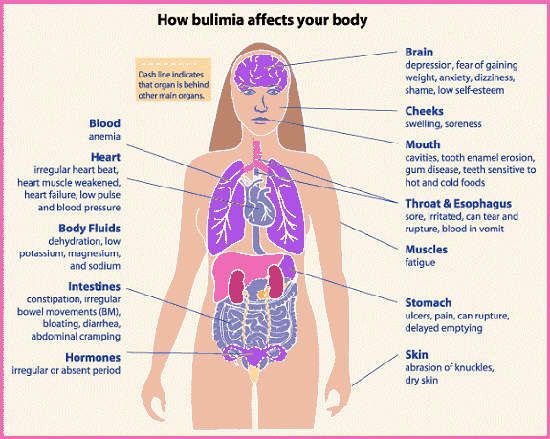
And for this INCREASED ENERGY AND NUTRIENTS (ie Food) IS SIMPLY REQUIRED.
Did you see the Dilemma?
An increase in the amount of food consumed will be used to restore a weakened organism.
In case of digestive disorders and nutrient absorption ( especially if you have been suffering from an eating disorder for more than a year) , a feeling of discomfort and bloating is more than likely.
Because of the physical discomfort caused by bloating, you may be eating less than your body actually needs (which can later trigger binge eating).
Due to a psychological disorder, increased anxiety and negative thoughts about food, you may experience fear of food and refuse it, or resort to "cleansing" the body.
HOWEVER, A BALANCED REGULAR DIET IS NECESSARY IF YOU WANT TO CURE THE DISORDER AND GET RID OF FOOD ADDICTION FOREVER
Therefore, unfortunately, endless restrictions, food breakdowns and purges will not save you from discomfort and bloating, no matter how difficult it is for you to go through the transition period: on the contrary, you will only harm yourself even more.
Don't forget that...
- You'll have to go through a pretty nasty transition before you start seeing improvements.
- But I will please you that it is very small - literally 2-4 weeks and then everything will pass and there will be a cozy silence in the stomach.
2. Fluid Retention And Bloating In Bulimia
Our body tends to retain fluid whenever dehydration occurs. And since all kinds of "cleansing": vomiting, excessive exercise, taking laxatives and / or diuretics cause dehydration, fluid retention in bulimia is as common as bloating.
Fluid retention is most acute in the case of an electrolyte imbalance in the body (which is a common side effect of "cleansing").
Fluid retention speeds up the body's recovery process.
See also: Help, I'm swollen! Curse and bless the recovery process from bulimia or anorexia
You may swell due to the body's natural ability to retain fluid, especially in those parts of the body in which active cellular regeneration takes place. The fact is that the liquid increases the efficiency of absorption of nutrients and accelerates the process of cleansing cells from the decay products of these elements.
The fact is that the liquid increases the efficiency of absorption of nutrients and accelerates the process of cleansing cells from the decay products of these elements.
3. Anxiety, Stress, and Bloating in Bulimia
It may seem strange that anxiety and stress can cause bloating in bulimia, but since the brain and gut are connected by the central nervous system, you cannot separate the processes occurring in your head on what's going on in your gut.
Every time the brain receives a signal of danger, or you experience anxiety or stress, or your blood glucose drops sharply, a natural defense mechanism is activated and cortisol is released.
There is no doubt that…
- Bulimia is a threat to your survival.
- Life with bulimia is full of anxiety and stress.
- Low blood glucose is the result of malnutrition, "starvation" or compulsive overeating followed by a "purge".
Although the recovery process does not pose a threat to your survival, you may experience severe stress.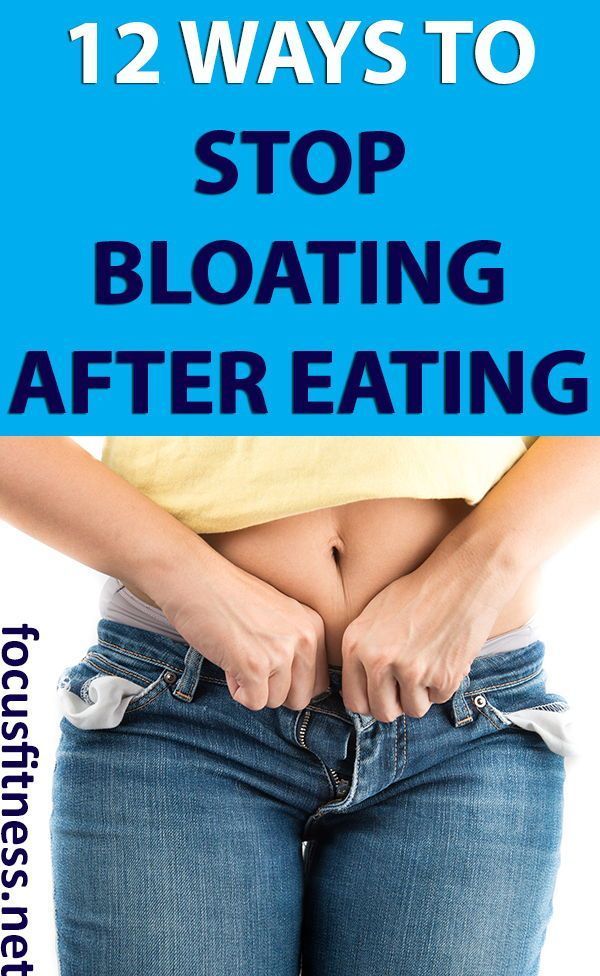
Cortisol itself isn't "bad" - it just helps get blood out of your stomach and into your muscles so you can "run and fight."
But if nothing threatens your life, and you do not need to "run and fight", cortisol continues to accumulate in the body. As a result, digestion is disturbed or slowed down, resulting in bloating and/or constipation.
4. Food Allergies and Bloating in Bulimia
Weakened or blocked activity of digestive enzymes can lead to food allergies, hypersensitivity or intolerance to certain foods - all of these phenomena can cause bloating.
- Reducing the diet is not conducive to recovery.
- Treatment of food allergies and intolerances to certain foods requires considerable effort and time.
What if the real reason is not food at all?
What if electrolyte imbalances and gastrointestinal disturbances are the result of your eating disorder?
It is possible that if it were not for bulimia, you would not have any problems, and your stomach would be quite capable of digesting any food * (* Although it also happens that due to constant restriction and lack of nutrients, food allergies and sensitivities can provoke the development of an eating disorder ).
I RECOMMEND YOUR INTESTINAL TREATMENT AT ALL STAGES OF PSYCHOTHERAPY OF RPP.
However, it is important to understand that constipation is the result of an impaired, inefficient and slow gastrointestinal tract, lack of fat and dehydration. Your body is starving for nutrients and fluids, not laxatives.
Read also: Life without laxatives
6. “Accelerated” nutrition and bloating with Bulimia
Do you feel anxiety or guilt during food? If this is the case, it is likely that you are eating too fast, which can lead to you swallowing air at the same time as you eat. And the air that ends up in your stomach also provokes bloating.
7. Lack of Sleep and Bloating in Bulimia
Restless sleep, as well as its lack, is quite common among patients who are trying to recover from bulimia.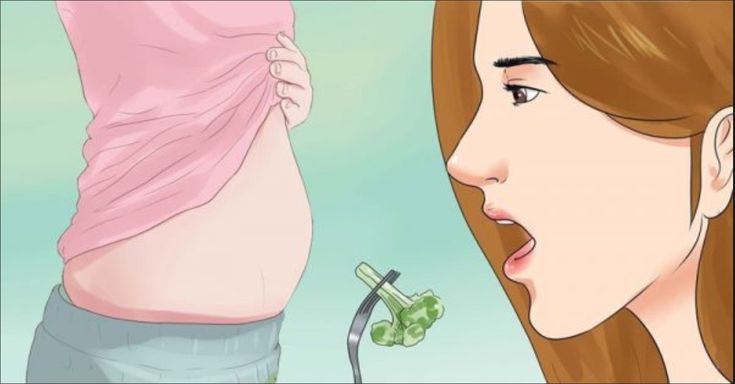
You have probably already noticed that lack of sleep negatively affects your mood, as well as your mental and physical activity, especially if your body is already weakened and exhausted. Increased production of cortisol, which accumulates in the body, can cause indigestion, cause bloating and provoke additional sleep problems.
See also: How many hours of sleep do you really need?
The Good and Bad News About Bloating With Bulimia
Still THE GOOD NEWS is that there are many ways to ease your pain and even speed up your recovery.
And here you are sure to ask: "How long will I have to suffer from a bloated stomach?".
Some people pass this period in 1-2 weeks, others need a month. It all depends on the depth of the eating disorder, its duration, whether you have previously used laxatives and diuretics, for how long.
BUT THIS IS ALL MANDATORY AND UNCOMPROMISHLY WILL PASS! Together with RPP, all stomach problems will also go away.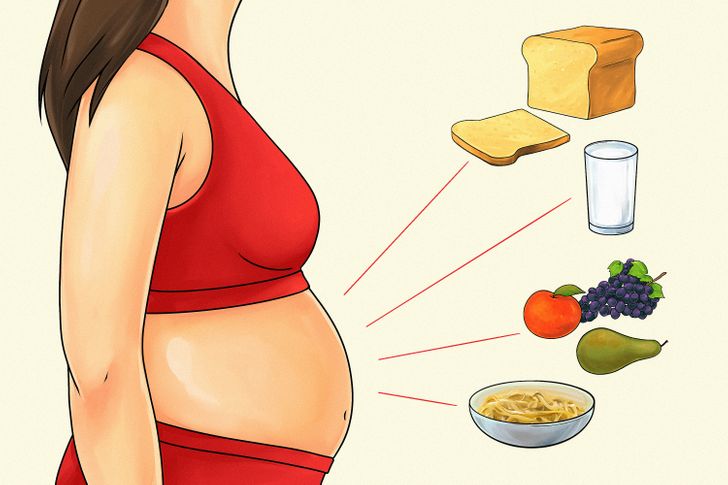
Olga Eremenko - Bloating in bulimia. What to do?
Dear girls, I'm Olga Eremenko, I'm glad to welcome you to my channel dedicated to bulimia. Today, I would like to talk about a problem that is close to everyone - bloating.
Why does this happen during the transition to a normal diet? What can be done to solve this problem? Let's try to answer all these questions together today.
There are several main causes of bloated abdomen. The most common cause of this situation is “shocked intestines” 🤯.
Imagine that you clean your intestines every day, they are used to being empty. Constantly use laxatives, making peristalsis passive. During the years of bulimia, all the enzymes necessary for digestion disappear. And after defeating an eating disorder, you decide to learn to eat normally, to keep food in yourself.
And the products, getting into the small intestine, lead it into a state of shock, flatulence, bloating, an internal feeling of fullness begins. These are not just troubles from a psychological point of view, it also does not look very nice from the aesthetic side when the stomach sticks out.
These are not just troubles from a psychological point of view, it also does not look very nice from the aesthetic side when the stomach sticks out.
The girls begin to be tormented by the question of what to do in this case, it seems that nutrition is getting better, but the problem of a big belly remains.
RECOMMEND:
- Correct your eating behavior from simple to complex food. After all, before food did not get into the small intestine, so you can’t immediately load it with everyone in a row. You need to introduce food in small portions, gradually increasing your diet.
- Don't rush. It is important to devote a sufficient amount of time to this issue and not to rush your own body. From two months to six is quite a normal period for the restoration of the natural functions of the digestive tract.
- Return your digestive tract to working condition, use additional enzymes for this purpose.
- Do not wear tight clothes, do not provoke negative thoughts in your head! This is a stepping stone to recovery.
 Almost everyone passes it! Discomfort is temporary!
Almost everyone passes it! Discomfort is temporary! - Do not dwell on the state of your stomach in this period. What exactly is it, what is happening there (sounds also appear strange).
- Another reason for the appearance of a bloated belly is an overload of the body with fiber. In fear of getting better at the exit from bulimia, many girls begin to sit down on the use of salads in large quantities, which also negatively affects the work of the gastrointestinal tract. For example, eating a head of cabbage at a time.
- Features of the structure of your body. The “Apple” figure, when the fat layer is concentrated precisely in the abdomen. I advise in this case:
Recall that even before bulimia, you were unhappy with your stomach. Therefore, do not find fault that he is "not like that." Accept the fact that the stomach will always be “not like that” for you and it’s not about bloating.
Recognize that this is your figure and it should be corrected, first of all, not only by eating behavior and physical activity, but also by clothing. You can not wear very tight clothes. Choose a wardrobe that can give you a sense of psychological comfort. For example, when I turned to the stylist, she suggested that I have an hourglass figure and that things cut off at the waist that divide the image in half do not fit.
You can not wear very tight clothes. Choose a wardrobe that can give you a sense of psychological comfort. For example, when I turned to the stylist, she suggested that I have an hourglass figure and that things cut off at the waist that divide the image in half do not fit.
Realize that cleansing the body will not change the structure and proportions of your body.
It's easier to take off tight clothes or loosen your seatbelt than it is to run and clean up.
- Condition of the abdomen after pregnancy and childbirth. And it doesn’t matter if it was a caesarean section or natural childbirth, if after the birth of a child you didn’t work on your stomach, didn’t pump your abs, didn’t restore muscle tone, which changed its original state in 9 months, then it’s not surprising that the stomach will stick out strongly.
Even my stomach does not always look flat now, for example, after eating or if I do not do abs for a long time. This is all physiological and normal.



